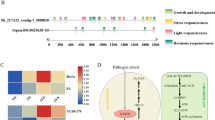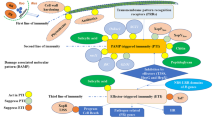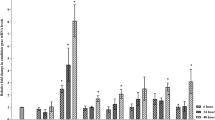Abstract
Main conclusion
MLP-PG1, identified in Cucurbita pepo, plays a crucial role in resistance against fungal pathogens through the induction of pathogenesis-related genes.
Astract
MLP-PG1, a major latex-like protein (MLP) from zucchini (Cucurbita pepo), was identified as a transporting factor for hydrophobic organic pollutants. MLPs are members of the Bet v 1 family, similar to pathogenesis-related class 10 proteins (PR-10s). However, the biological functions of MLPs remain unclear. Herein, we show that MLP-PG1 induces the expression of pathogenesis-related (PR) genes and indirectly promotes resistance against pathogens. The activity of the MLP-PG1 promoter in leaves of transgenic tobacco plants was significantly enhanced by inoculation with Pseudomonas syringae pv. tabaci. However, MLP-PG1 did not induce direct resistance through RNase activity. Therefore, we examined the possibility that MLP-PG1 is indirectly involved in resistance; indeed, we found that MLP-PG1 induced the expression of defense-related genes. Overexpression of MLP-PG1 highly upregulated PR-2 and PR-5 and decreased the area of lesions caused by Botrytis cinerea in the leaves of transgenic tobacco plants. Our results demonstrate that MLP-PG1 is involved in indirect resistance against plant diseases, especially caused by fungal pathogens, through the induction of PR genes. This study is the first report to show the induction of PR genes by the expression of MLP from the RNA sequencing analysis and the involvement of MLP-PG1 in the resistance.





Similar content being viewed by others
Data availability
The datasets generated during and/or analyzed during the current study are available from the corresponding author on reasonable request.
Abbreviations
- ACC:
-
1-Aminocyclopropane-1-carboxylic acid
- MeJA:
-
Methyl jasmonic acid
- MLP:
-
Major latex-like protein
- PR:
-
Pathogenesis-related protein
- PR-10:
-
Pathogenesis-related class 10 protein
- Pst :
-
Pseudomonas syringae Pv. tabaci
- SA:
-
Salicylic acid
References
Aggelis A, John I, Karvouni Z, Grierson D (1997) Characterization of two cDNA clones for mRNAs expressed during ripening of melon (Cucumis melo L.) fruits. Plant Mol Biol 33:313–322. https://doi.org/10.1023/A:1005701730598
Arnold K, Bordoli L, Kopp J, Schwede T (2006) The SWISS-MODEL workspace: a web-based environment for protein structure homology modelling. Bioinformatics 22:195–201. https://doi.org/10.1093/bioinformatics/bti770
Carella P, Merl-Pham J, Wilson DC et al (2016) Comparative proteomics analysis of phloem exudates collected during the induction of systemic acquired resistance. Plant Physiol 171:1495–1510. https://doi.org/10.1104/pp.16.00269
Chadha P, Das RH (2006) A pathogenesis related protein, AhPR10 from peanut: an insight of its mode of antifungal activity. Planta 225:213–222. https://doi.org/10.1007/s00425-006-0344-7
Chaturvedi R, Venables B, Petros RA et al (2012) An abietane diterpenoid is a potent activator of systemic acquired resistance. Plant J 71:161–172. https://doi.org/10.1111/j.1365-313X.2012.04981.x
Chen J-Y, Dai X-F (2010) Cloning and characterization of the Gossypium hirsutum major latex protein gene and functional analysis in Arabidopsis thaliana. Planta 231:861–873. https://doi.org/10.1007/s00425-009-1092-2
Choudhary DK, Prakash A, Johri BN (2007) Induced systemic resistance (ISR) in plants: mechanism of action. Indian J Microbiol 47:289–297. https://doi.org/10.1007/s12088-007-0054-2
Davies C, Robinson SP (2000) Differential screening indicates a dramatic change in mRNA profiles during grape berry ripening. Cloning and characterization of cDNAs encoding putative cell wall and stress response proteins. Plant Physiol 122:803–812. https://doi.org/10.1104/pp.122.3.803
Delano WL (2005) The case for open-source software in drug discovery. Drug Discoery Today 10:213–217. https://doi.org/10.1016/S1359-6446(04)03363-X
Fernandes H, Bujacz A, Bujacz G et al (2009) Cytokinin-induced structural adaptability of a Lupinus luteus PR-10 protein. FEBS J 276:1596–1609. https://doi.org/10.1111/j.1742-4658.2009.06892.x
Fernandes H, Michalska K, Sikorski M, Jaskolski M (2013) Structural and functional aspects of PR-10 proteins. FEBS J 280:1169–1199. https://doi.org/10.1111/febs.12114
Flores T, Alape-Giron A, Flores-Diaz M, Flores HE (2002) Ocatin. A novel tuber storage protein from the Andean tuber crop oca with antibacterial and antifungal activities. Plant Physiol 128:1291–1302. https://doi.org/10.1104/pp.010541
Fujita K, Haga Y, Yoshihara R et al (2020) Suppression of the expression of genes responsible for transporting of hydrophobic pollutants leads to the production of safer crops. Sci Total Environ 741:140439. https://doi.org/10.1016/j.scitotenv.2020.140439
Gai YP, Yuan SS, Liu ZY et al (2018) Integrated phloem sap mRNA and protein expression analysis reveals phytoplasma-infection responses in mulberry. Mol Cell Proteomics 17:1702–1719. https://doi.org/10.1074/mcp.RA118.000670
Goto J, Iwabuchi A, Yoshihara R et al (2019) Uptake mechanisms of polychlorinated biphenyls in Cucurbita pepo via xylem sap containing major latex-like proteins. Environ Exp Bot 162:399–405. https://doi.org/10.1016/j.envexpbot.2019.03.019
Hatmi S, Trotel-Aziz P, Villaume S et al (2014) Osmotic stress-induced polyamine oxidation mediates defence responses and reduces stress-enhanced grapevine susceptibility to Botrytis cinerea. J Exp Bot 65:75–88. https://doi.org/10.1093/jxb/ert351
Higo K, Ugawa Y, Iwamoto M, Korenaga T (1999) Plant cis-acting regulatory DNA elements (PLACE) database: 1999. Nucleic Acids Res 27:297–300. https://doi.org/10.1093/nar/27.1.297
Holmquist L, Dölfors F, Fogelqvist J et al (2020) Major latex protein-like encoding genes contribute to Rhizoctonia solani defense responses in sugar beet. Mol Genet Genom 296:155–164. https://doi.org/10.1007/s00438-020-01735-0
Horsch RB, Fry JE, Hoffmann NL et al (1985) A simple and general method for transferring genes into plants. Science 227:1229–1231. https://doi.org/10.1210/jcem-10-10-1361
Inui H, Sawada M, Goto J et al (2013) A major latex-like protein is a key factor in crop contamination by persistent organic pollutants. Plant Physiol 161:2128–2135. https://doi.org/10.1104/pp.112.213645
Inui H, Katte N, Goto J, Iwabuchi A (2020) High temperatures promote the uptake of hydrophobic pollutants by Cucurbita pepo via altered gene expression levels of major latex-like proteins. J Pestic Sci 45:75–80. https://doi.org/10.1584/jpestics.d19-065
Iwabuchi A, Katte N, Suwa M et al (2020) Factors regulating the differential uptake of persistent organic pollutants in cucurbits and non-cucurbits. J Plant Physiol 245:153094. https://doi.org/10.1016/j.jplph.2019.153094
Kloos DU, Oltmanns H, Dock C et al (2002) Isolation and molecular analysis of six taproot expressed genes from sugar beet. J Exp Bot 53:1533–1534. https://doi.org/10.1093/jxb/53.373.1533
Lebel S, Schellenbaum P, Walter B, Maillot P (2010) Characterisation of the Vitis vinifera PR10 multigene family. BMC Plant Biol 10:184. https://doi.org/10.1186/1471-2229-10-184
Liu Y-G, Mitsukawa N, Oosumi T, Whittier RF (1995) Efficient isolation and mapping of Arabidopsis thaliana T-DNA insert junctions by thermal asymmetric interlaced PCR. Plant J 8:457–463
Liu C, Cheng F, Sun Y et al (2016) Structure-function relationship of a novel PR-5 protein with antimicrobial activity from soy hulls. J Agric Food Chem 64:948–959. https://doi.org/10.1021/acs.jafc.5b04771
Lytle BL, Song J, de la Cruz NB et al (2009) Structures of two Arabidopsis thaliana major latex proteins represent novel helix-grip folds. Proteins Struct Funct Bioinform 76:237–243. https://doi.org/10.1002/prot.22396
Murashige T, Skoog F (1962) A revised medium for rapid growth and bio assays with tobacco tissue cultures. Physiol Plant 15:473–497. https://doi.org/10.1111/j.1399-3054.1962.tb08052.x
Nakagawa T, Suzuki T, Murata S et al (2007) Improved gateway binary vectors: High-performance vectors for creation of fusion constructs in transgenic analysis of plants. Biosci Biotechnol Biochem 71:2095–2100. https://doi.org/10.1271/bbb.70216
Nawrath C, Métraux J-P (1999) Salicylic acid induction-deficient mutants of Arabidopsis express PR-2 and PR-5 and accumulate high levels of camalexin after pathogen inoculation. Plant Cell 11:1393–1404. https://doi.org/10.1105/tpc.11.8.1393
Neale AD, Wahleithner JA, Lund M, Howard TB (1990) Chitinase, β-1,3-glucanase, osmotin, and extensin are expressed in tobacco explants during flower formation. Plant Cell 2:673–684. https://doi.org/10.1105/tpc.2.7.673
Nessler CL, Allen RD, Galewsky S (1985) Identification and characterization of latex-specific proteins in opium poppy. Plant Physiol 79:499–504. https://doi.org/10.1104/pp.79.2.499
Niki T, Mitsuhara I, Seo S et al (1998) Antagonistic effect of salicylic acid and jasmonic acid on the expression of pathogenesis-related (PR) protein genes in wounded mature tobacco leaves. Plant Cell Physiol 39:500–507. https://doi.org/10.1093/oxfordjournals.pcp.a029397
Pühringer H, Moll D, Hoffmann-Sommergruber K et al (2000) The promoter of an apple Ypr10 gene, encoding the major allergen Mal d 1, is stress- and pathogen-inducible. Plant Sci 152:35–50. https://doi.org/10.1016/S0168-9452(99)00222-8
Robert X, Gouet P (2014) Deciphering key features in protein structures with the new ENDscript server. Nucleic Acids Res 42:320–324. https://doi.org/10.1093/nar/gku316
Romera FJ, García MJ, Lucena C et al (2019) Induced systemic resistance (ISR) and Fe deficiency responses in dicot plants. Front Plant Sci 10:287. https://doi.org/10.3389/fpls.2019.00287
Schneider CA, Rasband WS, Eliceiri KW (2012) NIH Image to ImageJ: 25 years of image analysis. Nat Methods 9:671–675. https://doi.org/10.1038/nmeth.2089
Shi Y, Jiang L, Zhang L et al (2014) Dynamic changes in proteins during apple (Malus × domestica) fruit ripening and storage. Hortic Res 1:6. https://doi.org/10.1038/hortres.2014.6
Song L, Wang J, Jia H et al (2020) Identification and functional characterization of NbMLP28, a novel MLP-like protein 28 enhancing Potato virus Y resistance in Nicotiana benthamiana. BMC Microbiol 20:1–14. https://doi.org/10.1186/s12866-020-01725-7
Stoykova P, Inui H (2021) Transport enhancement of hydrophobic pollutants by the expression of zucchini major latex-like protein genes in tobacco plants. J Plant Physiol 263:153464. https://doi.org/10.1016/j.jplph.2021.153464
Suyama T, Yamada K, Mori H et al (1999) Cloning cDNAs for genes preferentially expressed during fruit growth in cucumber. J Am Soc Hortic Sci 124:136–139. https://doi.org/10.21273/JASHS.124.2.136
Williamson B, Tudzynski B, Tudzynski P, Van Kan JAL (2007) Botrytis cinerea: the cause of grey mould disease. Mol Plant Pathol 8:561–580. https://doi.org/10.1111/j.1364-3703.2007.00417.x
Wu F-Z, Lu T-C, Shen Z et al (2008) N-terminal acetylation of two major latex proteins from Arabidopsis thaliana using electrospray ionization tandem mass spectrometry. Plant Mol Biol Rep 26:88–97. https://doi.org/10.1007/s11105-008-0027-6
Yang CL, Liang S, Wang HY et al (2015) Cotton major latex protein 28 functions as a positive regulator of the ethylene responsive factor 6 in defense against Verticillium dahliae. Mol Plant 8:399–411. https://doi.org/10.1016/j.molp.2014.11.023
Yuan G, He S, Bian S et al (2020) Genome-wide identification and expression analysis of major latex protein (MLP) family genes in the apple (Malus domestica Borkh.) genome. Gene 733:144275. https://doi.org/10.1016/j.gene.2019.144275
Zhang N, Li R, Shen W et al (2018) Genome-wide evolutionary characterization and expression analyses of major latex protein (MLP) family genes in Vitis vinifera. Mol Genet Genom 293:1061–1075. https://doi.org/10.1007/s00438-018-1440-7
Zhang SB, Zhang WJ, Zhai HC et al (2019) Expression of a wheat β-1,3-glucanase in Pichia pastoris and its inhibitory effect on fungi commonly associated with wheat kernel. Protein Exp Purif 154:134–139. https://doi.org/10.1016/j.pep.2018.10.011
Acknowledgements
We are deeply grateful to Prof. Dr. Shigeo Takumi (Graduate School of Agricultural Science at Kobe University), Prof. Dr. Kentaro Yoshida (Graduate School of Agricultural Science at Kobe University), and Prof. Dr. Shigeyuki Betsuyaku (Graduate School of Life and Environmental Science at the University of Tsukuba) for their helpful advice and fruitful discussions, and Prof. Dr. Tsuyoshi Nakagawa (Organization for Research and Academic Information, Interdisciplinary Center for Science Research at Shimane University) for kindly providing the plant expression plasmids pGWB402Ω and pGWB502Ω. This work was partly supported by the Sasakawa Scientific Research Grant from The Japan Science Society (2019-5004) to KF and the Murao Educational Foundation (2017) to HI.
Funding
This work was partly supported by the Sasakawa Scientific Research Grant from The Japan Science Society (2019–5004) to KF and the Murao Educational Foundation (2017) to HI.
Author information
Authors and Affiliations
Corresponding author
Ethics declarations
Competing interests
The authors have no conflicts of interest to declare that are relevant to the content of this article.
Additional information
Communicated by Dorothea Bartels.
Publisher's Note
Springer Nature remains neutral with regard to jurisdictional claims in published maps and institutional affiliations.
Supplementary Information
Below is the link to the electronic supplementary material.
Rights and permissions
About this article
Cite this article
Fujita, K., Asuke, S., Isono, E. et al. MLP-PG1, a major latex-like protein identified in Cucurbita pepo, confers resistance through the induction of pathogenesis-related genes. Planta 255, 10 (2022). https://doi.org/10.1007/s00425-021-03795-x
Received:
Accepted:
Published:
DOI: https://doi.org/10.1007/s00425-021-03795-x




